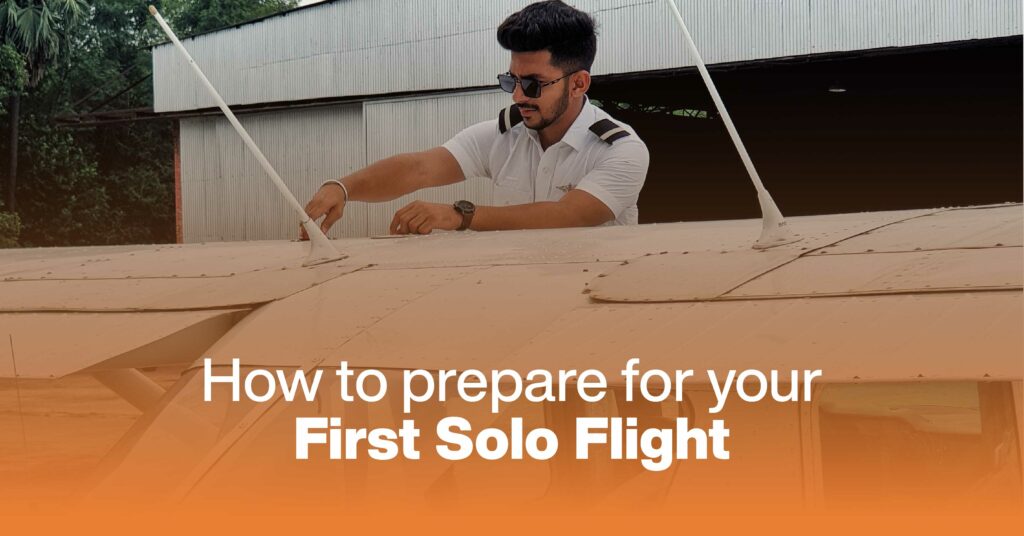Are you ready to take to the skies on your first solo flight? The thought of flying a plane without an instructor by your side can be both exhilarating and nerve-wracking. But with proper preparation and a strong foundation of knowledge, you can confidently navigate through your first solo flight. In this article, we will guide you through the process of preparing for this milestone, providing you with valuable tips to ensure a safe and successful solo flight experience.
Understanding Solo Flight
Before we delve into the preparation tips, let’s first understand what a solo flight entails. A solo flight refers to the moment when a student pilot takes control of an aircraft without the presence of an instructor. This marks a significant milestone in a pilot’s training journey, as it demonstrates their proficiency and readiness to handle an aircraft independently.
Tips To Prepare For Your Solo Flight
1. Know When You Are Ready
One of the most crucial aspects of preparing for your first solo flight is ensuring that you are well-prepared and confident in your abilities. Pay attention to the feedback and guidance given by your flight instructor. They will assess your skills and knowledge to determine when you are ready to fly solo. Trust their judgment and don’t rush the process.
2. Understand The Regulatory Requirements
Before embarking on your solo flight, familiarize yourself with the regulatory requirements set by aviation authorities. Each country may have specific regulations and prerequisites for a solo flight. Ensure that you meet all the necessary criteria, such as the minimum flight hours, medical certificates, and age requirements.
3. Practice Emergency Procedures
During your flight training, you will learn various emergency procedures. It is essential to practice these procedures repeatedly to ensure that you can react calmly and confidently in case of an emergency during your solo flight. Familiarize yourself with protocols for engine failures, loss of communication, and other potential scenarios.
4. Visualize And Rehearse The Flight
Mental preparation is just as important as physical practice. Visualize your solo flight from start to finish, going through all the necessary steps and procedures. This mental rehearsal will help you build confidence and make your first solo flight feel more familiar. Consider using flight simulators or virtual training tools to further enhance your preparation.
5. Communicate With Your Instructor
Although you will be flying solo, it is crucial to establish clear communication with your instructor and the air traffic control throughout your flight. They will be there to support and guide you if you encounter any challenges or require assistance. Familiarize yourself with the communication protocols and frequencies relevant to your flight.
6. Plan Your Flight Route
Create a detailed flight plan before your solo flight, considering aspects such as weather conditions, airspace restrictions, and traffic. Plan your route, including checkpoints and emergency landing options. This preparation will ensure that you have a clear roadmap and minimize surprises during your flight.
7. Pre-flight Checklist
Before taking off, go through a comprehensive pre-flight checklist. Pay attention to aircraft maintenance, fuel levels, control surfaces, and navigation equipment. Completing this checklist will help you identify any potential issues and ensure that your aircraft is in optimal condition for the flight.
8. Stay Calm And Focused
Finally, during your solo flight, remember to stay calm and focused. Trust in your training, remain attentive to your surroundings, and adhere to standard operating procedures. Keep a clear mind and enjoy the experience of taking control of the aircraft on your own.
Frequently Asked Questions
1. How do I know when I am ready for my first solo flight?
You will know you are ready for your first solo flight when your flight instructor confirms your proficiency and gives you the green light. Trust their expertise and guidance throughout your training.
2. What are the regulatory requirements for a solo flight?
The regulatory requirements for a solo flight may vary depending on your country. Ensure that you meet the minimum flight hours, age requirements, and possess the necessary medical certificates as mandated by the aviation authorities.
3. What should I expect during my first solo flight?
During your first solo flight, you can expect a sense of independence and freedom as you take command of the aircraft. However, it is vital to remain focused and follow all the procedures you’ve learned during your training.
4. Can I communicate with my instructor during my first solo flight if I need assistance?
While you will be flying solo, you can still communicate with your instructor and air traffic control if you require assistance. Clear communication channels ensure that you can seek guidance if needed.
5. How long will my first solo flight last?
The duration of your first solo flight will depend on various factors, including your flight plan and the training requirements. Typically, it can last anywhere between 20 minutes to 40 minutes.
Conclusion
Preparing for your first solo flight is an exciting and memorable experience. By following these tips and adequately preparing yourself, you can embark on this milestone with confidence and a firm foundation of knowledge. Remember to prioritize safety, trust in your training, and enjoy the journey of becoming a skilled and independent pilot. Safe travels!

